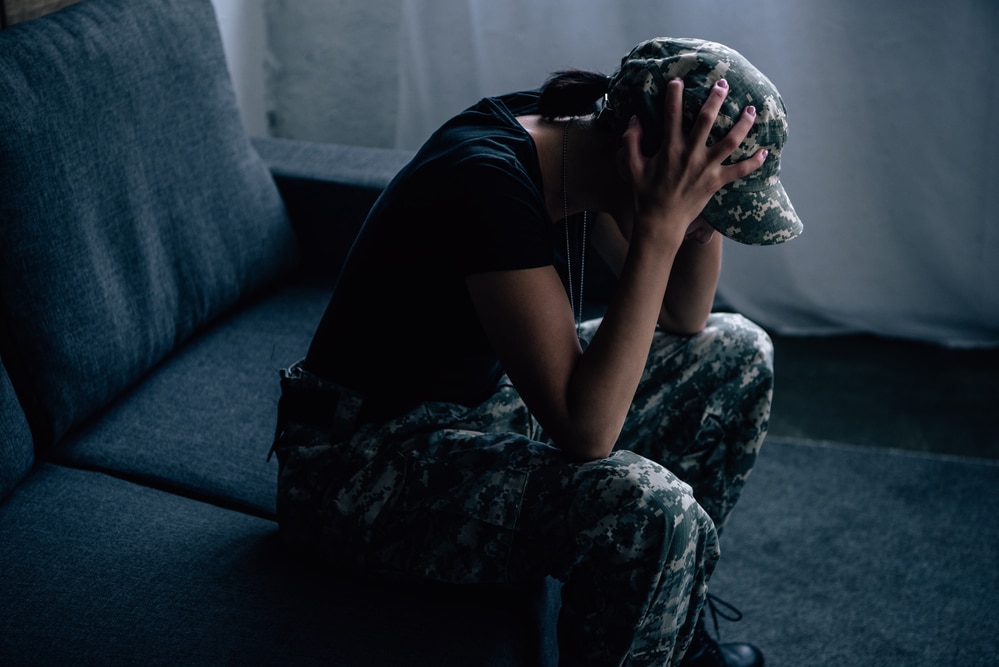The brave men and women who serve in our military face unimaginable challenges. Among these challenges, alcohol abuse stands out as a significant concern. The trauma and stress of combat, coupled with the pressures of military life, can lead many service members down a path of excessive alcohol consumption and can potentially lead to military discharge for alcohol abuse. This article examines alcohol abuse in the military, the unique complexities of this issue, and highlights the specialized treatment options available at Behavioral Health Centers.

The Reality of Alcohol Abuse Among Veterans
The military community, often celebrated for its resilience and courage, is not immune to the challenges of alcohol abuse. The prevalence of abusing alcohol and alcohol misuse among veterans is a pressing concern that demands attention. Over one in ten veterans struggle with a substance use disorder, whether it be alcohol or drug abuse, or both, and many of those seeking treatment specifically report an alcohol addiction. These figures are not mere statistics on a page; they represent real individuals, heroes who have donned the uniform, served our nation, and are now confronting a formidable adversary in alcohol addiction. Due to how alcohol affects behavior, military discharge for alcohol abuse for active military members can happen if the issue of alcoholism is not addressed.
The reasons behind this high rate of problematic alcohol use among veterans are multifaceted. For many, the military experience, especially deployments in combat zones, exposes them to traumatic events that can leave lasting psychological scars, leading to mental disorders. The Journal of the American Medical Association (JAMA) conducted a study revealing that active-duty military personnel deployed to areas like Iraq and Afghanistan often resort to alcohol as a coping mechanism. Their traumatic experiences correlate with heavy weekly drinking and binge drinking patterns.
Binge drinking, defined as consuming five or more drinks within a day or during an event for men (and four or more for women), emerged as a significant concern. Over 53% of military personnel surveyed admitted to such drinking habits. This behavior is not just about the quantity of alcohol consumed; it indicates an underlying attempt to numb the pain, cope with memories, or even fit into a perceived military culture.
Furthermore, the study highlighted several key findings:
- Younger service members, especially those born after 1980, are more prone to alcohol use disorders.
- Those deployed are at a heightened risk of developing mental health disorders, particularly PTSD, which can further exacerbate alcohol misuse.
- Service members who reported mental or physical illnesses or chronic medication use were significantly more likely to face alcohol-related challenges and substance misuse.
- Interestingly, women in the military were found to be more prone to heavy drinking than their male counterparts.
The gravity of these findings underscores the need for comprehensive support systems and interventions. While many treatment centers offer addiction programs to assist inactive military personnel, the persistence of these issues indicates a gap that needs addressing. The trauma from combat, the pressures of military life, and the challenges of reintegration into civilian life can all contribute to unhealthy coping mechanisms, making specialized treatment and understanding essential.

The Dual Challenge: PTSD and Addiction
Post-traumatic stress disorder (PTSD) is a profound mental health condition that arises from experiencing or witnessing traumatic events. For many veterans, these events are not limited to the battlefield. The very nature of military service, with its unique pressures, separations from loved ones, and exposure to life-threatening situations, can be a breeding ground for traumatic experiences. When combined with the challenges of reintegration into civilian life, the weight of these experiences can become overwhelming.
PTSD manifests in various symptoms, ranging from intense flashbacks that transport the individual back to the traumatic event to nightmares that disrupt sleep and bring the trauma to life again and again. Paranoia, a heightened state of alertness even in safe environments, can make daily life a constant challenge. Feelings of detachment can strain personal relationships, and unwarranted bouts of anger can alienate loved ones. While distressing in their own right, these symptoms are further complicated when alcohol or drugs are used as coping mechanisms.
For veterans with PTSD, alcohol can offer a temporary escape. It might dull the sharp edges of a flashback or provide a brief respite from the constant anxiety. However, this temporary relief can come at a high cost. The brain’s chemistry can change with regular alcohol consumption, leading to increased dependence. Over time, what might have started as occasional drinking can escalate into a full-blown addiction.
The relationship between PTSD and addiction is cyclical. The symptoms of PTSD can drive a person to seek solace in alcohol or drugs, and the subsequent substance abuse can intensify the symptoms of PTSD. This vicious cycle can trap veterans in a pattern of increasing despair. For instance, alcohol might temporarily relieve insomnia, but over time, it can disrupt deep sleep patterns, leading to increased fatigue and exacerbating PTSD symptoms.
Moreover, the physical toll of addiction combined with PTSD can be devastating. Veterans with PTSD often report chronic pain, and substance abuse can lead to various health issues, from liver damage to cardiovascular diseases. The mental and physical toll underscores the need for specialized treatment for trauma and addiction.
It’s also worth noting that the trauma leading to PTSD isn’t always combat-related. Many veterans experience military sexual trauma (MST), which can add another layer of complexity to their mental health challenges. The shame, guilt, and stigma associated with MST can drive some veterans further into secrecy and isolation, making them want to drink alcohol as a coping mechanism.
In understanding the dual challenge of treating PTSD and addiction, it becomes clear that addressing one without the other is insufficient. Comprehensive treatment approaches that tackle the root traumatic experiences and the resulting substance use disorders are crucial for veterans to find a path to recovery.

The Path to Recovery at Behavioral Health Centers
Behavioral Health Centers offers hope by providing treatment programs for veterans with mental health issues, alcohol use disorder, and PTSD. Their specialized treatment programs are tailored to address the unique challenges veterans face. Some of the therapies offered include:
- Cognitive-behavioral therapy (CBT): CBT helps veterans identify and change negative thought patterns and behaviors contributing to their addiction and PTSD symptoms.
- Dialectical Behavior Therapy (DBT): DBT focuses on validating feelings and teaching skills to manage PTSD symptoms. It’s particularly beneficial in a group setting where veterans can draw strength from shared experiences.
- Eye Movement Desensitization and Reprocessing Therapy (EMDR): EMDR is a unique therapy that uses external stimuli to help veterans process traumatic memories. It’s been singled out as especially effective for veterans with substance abuse disorders and PTSD.
The journey to recovery is not a straight path but achievable with the best support and treatment. Veterans don’t have to face their challenges alone. If you or a loved one is struggling with alcohol abuse or PTSD, contact the Behavioral Health Centers experts. Our dedicated team understands veterans’ unique challenges and is committed to helping them find a path to recovery from mental health challenges and addiction.
Don’t wait. Your path to a brighter future starts with a single call. Contact Behavioral Health Centers for treatment at 855-299-4472 today.





